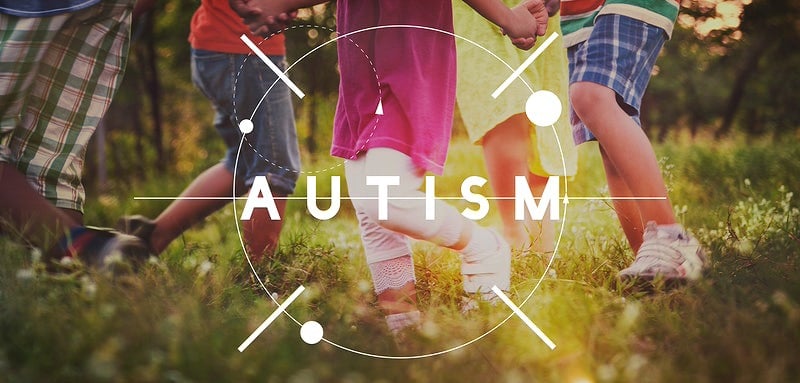When people struggle with their interpersonal skills, such as social interaction or communication with others, they rarely consider autism to be a potential diagnosis. This is because people neglect to understand that autism is a spectrum disorder. The “spectrum” part refers to the wide range and variations of symptoms that accompany the condition of autism.
What is Autism Spectrum Disorder (ASD)?
Autism spectrum disorder, typically referred to as autism, is a complex developmental disorder. This condition poses significant challenges relating to behavior, social skills, and overall communication. It can be difficult to diagnose, as the symptoms associated with ASD range in intensity and severity.
Different from other neurological or developmental disorders, people with autism spectrum disorder are not set apart by visual disability but instead struggle with many interpersonal skills. Individuals with ASD are likely to communicate, learn, and interact with others in ways that differ from typical norms.
Although the concept of autism was coined over a hundred years ago, the term autism spectrum disorder was created in the last several years and is now used to define the following conditions: autistic disorder, Asperger syndrome, and pervasive developmental disorder.
Signs & Symptoms of ASD
Individuals with ASD experience difficulties in many areas of life, especially in regards to social interaction, sustaining interests, and repeating behaviors. There are many signs and symptoms of ASD, as it is a spectrum disorder. Not all individuals with ASD will exhibit the following behaviors, but most will exhibit a few of each category.
Social interaction and communication behaviors in individuals with ASD may show up as:
- little to no eye contact during conversation
- struggling to understand another person’s perspective or point of view
- avoiding listening to others
- experiencing difficulties with back and forth conversations with others
- having an unusual tone of voice, such as robot-like or sing-song
- failing or neglecting to respond to someone calling their name
- exhibiting facial expressions or reactions that do not match with the tone of a conversation
- talking at length about an interest without noticing a lack of engagement of others in the conversation, or neglecting to give others a chance to respond
- preferring not to engage in physical touch such as hugging or cuddling
Repetitive behaviors in individuals with ASD may show up as:
- getting worked up over slight changes in a typical routine
- being more or less sensitive to sensory experiences (such as light, sound, clothing, or temperature) than other people
- repeating behaviors or having unusual behaviors
- being overly focused on interests such as watching moving objects
When discussing mental health conditions and especially associated symptoms, many people neglect to highlight some notable strengths of certain conditions. Although individuals with ASD experience many interpersonal challenges, they are likely to exhibit several strengths such as:
- attention to detail and ability to retain information
- being visual and auditory learners
- excelling in many fields of study, such as science, music, art, or math
How is ASD Diagnosed?
ASD can be difficult to diagnose because of the extreme variety of symptoms that each person with ASD experiences. As it is a developmental disorder, symptoms generally appear within the first two years of an individual’s life. However, ASD can still be diagnosed at any age.
If you are concerned that you or your loved one may be showing signs of ASD, consider getting a clinical evaluation from a mental health or medical professional. An evaluation may assess things like cognitive ability or thinking skills, language abilities, and age-appropriate skills pertaining to an individual’s age.
Treatment for ASD
Treatment for ASD should begin immediately after diagnosis in order to combat some of the developmental challenges that the condition may pose on a person’s life. Early treatment for this condition can help teach struggling individuals new skills while encouraging them to utilize their strengths to the best of their ability.
Like many mental health conditions, there is no one treatment for ASD. A treatment facility must work closely with your loved one so that they can create an individualized treatment plan for them as they find comfort and healing. Medication is available to help with factors such as:
- hyperactivity
- attention and concentration issues
- anxiety
- depression
- irritability
- aggression
- repetitive behavior
Other treatments for ASD involve psychotherapy approaches that tailor to behavioral, psychological, and educational elements of an individual’s life. Highly structured, intensive programs may also involve the help of family members to help teach life skills to the struggling individual. Helpful treatment programs target the following:
- reducing challenging or intrusive thoughts and behaviors
- teaching necessary life skills to help foster independence
- increasing or focusing on current strengths
- learning better overall interpersonal skills such as communication and language
Autism spectrum disorder is a developmental condition characterized by difficulties and challenges with social interaction, communication, and behavior. This condition is a “spectrum” condition because symptoms vary in type and intensity much greater than other conditions. The availability for treatment of this condition continues to increase, with more treatment options targeting fostering necessary life and social skills related to independence. SoCal Mental Health is a short-term stabilization and transitional residential treatment center located in California. Our staff ensures that every client is treated with compassion alongside personalized care to help them heal from distressing symptoms associated with various mental health conditions. We understand that mental illness can create crippling impairment for physical and mental wellbeing and believe that everyone deserves to find peace from inhibiting symptoms. Autism spectrum disorder is just one of the many conditions that we help treat. For more information about our program, give us a call at (949) 502-2041.












